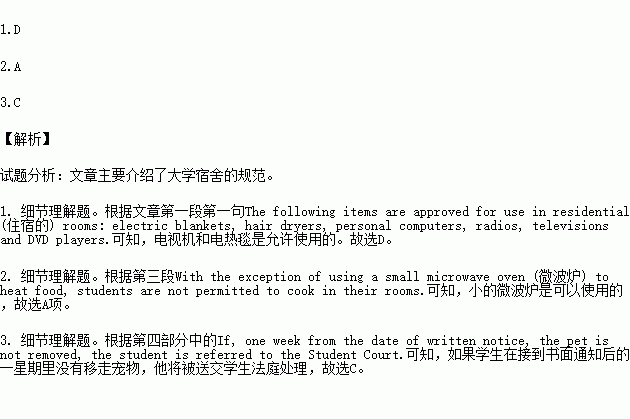题目内容
University Room Regulations
Approved and Prohibited Items
The following items are approved for use in residential rooms: electric blankets, hair dryers, personal computers, radios, televisions and DVD players. Items that are not allowed in student rooms include: candles, ceiling fans, fire works, waterbeds, sun lamps and wireless routers. Please note that any prohibited items will be taken away by the Office of Residence Life.
Access to Residential Rooms
Students are provided with a combination for their room door locks upon check-in. Do not share your room door lock combination with anyone. The Office of Residence Life may change the door lock combination at any time at the expense of the resident if it is found that the student has shared the combination with others. The fee is $25 to change a room combination.
Cooking Policy
Students living in buildings that have kitchens are only permitted to cook in the kitchen. Students must clean up after cooking. This is not the responsibility of housekeeping staff. Kitchens that are not kept clean may be closed for use. With the exception of using a small microwave oven to heat food, students are not permitted to cook in their rooms.
Pet Policy
No pets except fish are permitted in student rooms. Students who are found with pets, whether visiting or owned by the student, are subject to an initial fine of $100 and a continuing fine of $50 a day per pet. Students receive written notice when the fine goes into effect. If, one week from the date of written notice, the pet is not removed, the student is referred to the Student Court.
1.Which of the following items is allowed in student rooms?
A. Ceiling fans and waterbeds.
B. Wireless routers and radios.
C. Hair dryers and candles.
D. TVs and electric blankets.
2.What do we know about the cooking policy?
A. A microwave oven can be used.
B. Cooking in student rooms is permitted.
C. A housekeeper is to clean up the kitchen.
D. Students are to close kitchen doors after cooking.
3.If a student has kept a cat in his room for a week since the warning, he will face .
A. parent visits B. a fine of $100
C. the Student Court D. a written notice

